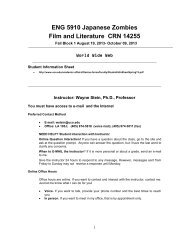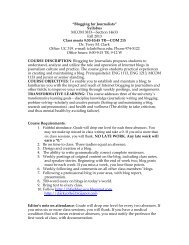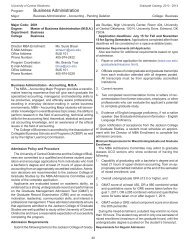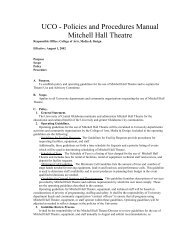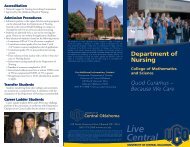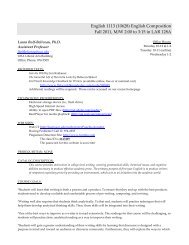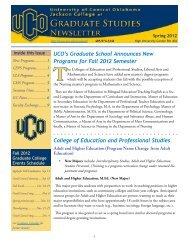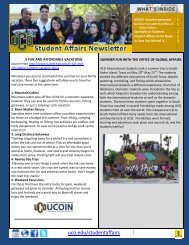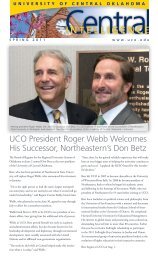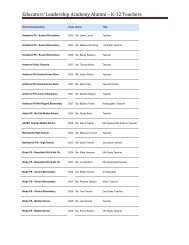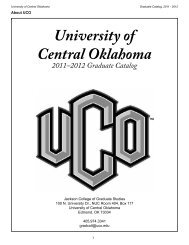Graduate Catalog - University of Central Oklahoma
Graduate Catalog - University of Central Oklahoma
Graduate Catalog - University of Central Oklahoma
Create successful ePaper yourself
Turn your PDF publications into a flip-book with our unique Google optimized e-Paper software.
<strong>University</strong> <strong>of</strong> <strong>Central</strong> <strong>Oklahoma</strong><br />
<strong>Graduate</strong> <strong>Catalog</strong>, 2012 - 2013<br />
<strong>Graduate</strong> Course Descriptions<br />
FRSC 5423 - Bloodstain Pattern Analysis II<br />
This is the second course in the study <strong>of</strong> bloodstain pattern analysis.<br />
The course provides a comprehensive review <strong>of</strong> this highly specialized<br />
crime scene reconstruction tool. Students will utilize current literature,<br />
case studies, laboratory experiments and computer simulation<br />
to gain experience in using bloodstain patterns in reconstructing<br />
crime scenes. Emphasis is given to the mathematical formulas and<br />
calculations involving trigonometry and physics. Emphasis is also<br />
given to preparing students to become qualified as expert witnesses<br />
for court testimony. Prerequisite(s): FRSC 5413.<br />
FRSC 5443 - Forensic Arson Investigation<br />
This is a comprehensive course on fire investigation emphasizing<br />
the use <strong>of</strong> specialized forensic techniques for the identification <strong>of</strong><br />
causes <strong>of</strong> fires. Major topics included in this course are the chemistry<br />
<strong>of</strong> fire, how to diagram the fire scene, common types <strong>of</strong> building<br />
construction and the effects <strong>of</strong> construction on how structures burn.<br />
Proper collection <strong>of</strong> physical evidence, documentation, analysis and<br />
preservation as related to fire investigations will be emphasized.<br />
Prerequisite(s): FRSC 5102.<br />
FRSC 5463 - Digital Forensics<br />
Digital Forensics is designed to provide the student with the fundamental<br />
concepts <strong>of</strong> the forensic analysis <strong>of</strong> digital evidence. Students<br />
will receive step-by-step explanations on how to use the most popular<br />
digital forensic tools. Topics include digital imaging, legal restrictions<br />
related to personal privacy and electronic communication, examination<br />
<strong>of</strong> FAT and NTFS based file systems, forensic methodologies,<br />
and the proper documentation <strong>of</strong> digital forensic examinations.<br />
Prerequisitie(s): FRSC 2503.<br />
FRSC 5513 - Forensic Chemistry & Lab<br />
Forensic Chemistry serves as a “hands-on” introduction to modern<br />
forensic chemistry. Topics and analytical techniques covered include<br />
sampling and statistics, sample preparation, instrumentation, and<br />
analyses related to drugs, arson, explosives, inks, paints and polymer<br />
evidence. Prerequisite(s): FRSC 2503 and CHEM 3454. Concurrent<br />
enrollment in FRSC 5513L required.<br />
FRSC 5513L - Forensic Chemistry Lab<br />
This is the laboratory course that accompanies FRSC 5513.<br />
Prerequisite(s): FRSC 2503 and CHEM 3454. Concurrent enrollment<br />
in FRSC 5513 required.<br />
FRSC 5533 - Forensic Microscopy & Lab<br />
Forensic Microscopy will study the modern uses <strong>of</strong> the steromicroscope,<br />
compound light microscope, polarized light microscope,<br />
fluorescence microscope, phase-contrast microscope and the SEM/<br />
TEM in a forensic context. Topics and analytical techniques covered<br />
include specimen preparation, staining and contrast methods, electron<br />
micrographs and other analytical approaches to forensic science.<br />
An introduction into field deployable microscopic techniques, physical<br />
match examinations, and lamp filament examinations will also<br />
be covered. Prerequisite(s): FRSC 2503 and (BIO 1114 or 1204 or<br />
1214). Concurrent enrollment in FRSC 5533L is required.<br />
FRSC 5533L - Forensic Microscopy Lab<br />
This is the laboratory course that accompanies FRSC 5533.<br />
Prerequisite(s): FRSC 2503 and (BIO 1114 or 1204 or 1214). Concurrent<br />
enrollment in FRSC 5533 is required.<br />
FRSC 5543 - Advanced Firearm and Toolmark<br />
Advanced Firearm and Toolmark Techniques and Laboratory is an<br />
advanced course focused on chemical restorative techniques and<br />
advanced scientific applications and techniques routinely seen in<br />
Firearm and Toolmark examinations. Techniques covered include<br />
distance determination, caliber and weapon determination, serial<br />
number restoration, toolmark examination, cartridge case/projectile<br />
macroscopic analysis, and courtroom testimony. Emphasis is given<br />
to quality control and quality assurance as practiced in today’s crime<br />
laboratories. Prerequisite(s): FRSC 5353. Concurrent enrollment in<br />
FRSC 5543L is required.<br />
FRSC 5543L - Adv Firearm and Toolmark Lab<br />
FRSC 5543L is the laboratory course that accompanies FRSC<br />
5543 Advanced Firearm and Toolmark Techniques and Laboratory.<br />
Prerequisite(s): FRSC 5353. Concurrent enrollment in FRSC 5543<br />
is required.<br />
FRSC 5553 - WMD Forensics<br />
Weapons <strong>of</strong> Mass Destruction (WMD) Forensics will cover chemical,<br />
biological, radiological, nuclear, and explosive (CBRNE) agents associated<br />
with domestic and international terrorism events. Students<br />
will be introduced to crime scene processing involving CBRNE events<br />
and the corresponding laboratory and field analyses. Prerequisite(s):<br />
FRSC 2503 or equivalent.<br />
FRSC 5613 - Advanced Forensic DNA Analysis<br />
Advanced Forensic DNA Analysis focuses on the specific principles<br />
and modern procedures used in the analysis <strong>of</strong> forensic DNA evidence.<br />
Other topics include current research and development for forensic<br />
DNA instrumentation and applications, statistical interpretation <strong>of</strong><br />
results, and case report writing. Students will research and present<br />
on historical forensic cases and current discussion topics in the field<br />
<strong>of</strong> DNA analysis. Prerequisite(s): FRSC 5333.<br />
FRSC 5633 - Digital Forensics Tools and An<br />
Digital Forensics Tools and Analysis will expose students to advanced<br />
concepts in digital forensic analysis and provide an in-depth study <strong>of</strong><br />
the current tools used in the examination <strong>of</strong> digital evidence. Topics<br />
include: advanced legal concepts, analyzing media with Forensic<br />
Toolkit, EnCase, and open source tools, Windows registry analysis,<br />
acquisition and analysis <strong>of</strong> volatile data, E-mail analysis, data hiding<br />
techniques, metadata, data carving and log analysis. Prerequisite(s):<br />
FRSC 5463.<br />
FRSC 5873 - Research Methods in Foren Sci<br />
Research Methods in Forensic Science is designed to acquaint<br />
students with quantitative and qualitative research methodologies,<br />
including an in-depth analysis <strong>of</strong> the following: conceptualization<br />
<strong>of</strong> research, types <strong>of</strong> sampling strategies, data collection methods,<br />
research design, and proposal writing. Prerequisite(s): permission<br />
<strong>of</strong> the instructor.<br />
FRSC 5881 - Management and Leadership<br />
Management and Leadership in Forensic Science is designed to<br />
acquaint students with a variety <strong>of</strong> critically important concepts in<br />
forensic science to include legal issues for managers related to<br />
privacy, records, hiring, termination, and performance; leadership<br />
and management styles; chain <strong>of</strong> command structures; pr<strong>of</strong>essional<br />
responsibility and internal inquiry matters; and understanding expectations<br />
<strong>of</strong> managers on new and seasoned employees. In addition,<br />
the students will be introduced to current topics in forensic science<br />
management and leadership through a special seminar series.<br />
Prerequisite(s): FRSC 5873.<br />
225





